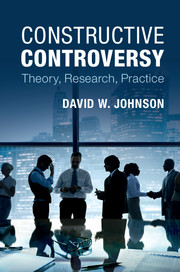Book contents
- Frontmatter
- Contents
- List of figures
- List of tables
- Acknowledgments
- 1 Underlying foundations of constructive controversy
- 2 The nature of constructive controversy
- 3 Theory of constructive controversy
- 4 The processes of constructive controversy and concurrence seeking
- 5 The outcomes of constructive controversy
- 6 Conditions mediating the effects of constructive controversy
- 7 Constructive controversy and decision making
- 8 Constructive controversy in education
- 9 Constructive controversy and political discourse in democracies
- 10 Constructive controversy, creativity, and innovation
- 11 Constructive controversy and building and maintaining peace
- 12 Conclusions
- References
- Index
5 - The outcomes of constructive controversy
Published online by Cambridge University Press: 05 June 2015
- Frontmatter
- Contents
- List of figures
- List of tables
- Acknowledgments
- 1 Underlying foundations of constructive controversy
- 2 The nature of constructive controversy
- 3 Theory of constructive controversy
- 4 The processes of constructive controversy and concurrence seeking
- 5 The outcomes of constructive controversy
- 6 Conditions mediating the effects of constructive controversy
- 7 Constructive controversy and decision making
- 8 Constructive controversy in education
- 9 Constructive controversy and political discourse in democracies
- 10 Constructive controversy, creativity, and innovation
- 11 Constructive controversy and building and maintaining peace
- 12 Conclusions
- References
- Index
Summary
THE INKLINGS
Two of the most influential English writers of the twentieth century were J. R. R. Tolkien and C. S. Lewis. Tolkien wrote The Hobbit and The Lord of the Rings trilogy. Lewis wrote a series of theological books (such as Mere Christianity as well as The Narnia Chronicles). While each is recognized as a genius, what many people do not know is that the two men were close friends, deeply involved in each other's work, and greatly influenced by each other's thought and writing.
The answer to how these disparate individuals became such close friends may be found in a group known as “The Inklings” (which means “hints, suggestions, or vague ideas”). The Inklings met twice a week. One of the members would produce a manuscript (a poem, story, or chapter) and begin to read it aloud. Other members’ criticism and support would follow. Then there might be more reading before the proceedings drifted into a general discussion and often heated debate on almost any subject that happened to arise. This process created a number of important outcomes.
The first outcome was encouragement. In C. S. Lewis, for example, Tolkien found an appreciative and sympathetic audience. “The unpayable debt that I owe to him,” Tolkien wrote of Lewis years later, “was not ‘influence’ as it is ordinarily understood, but sheer encouragement.”
The second outcome was motivation. Tolkien told Walter Hooper, “I wrote the Lord of the Rings to make Lewis a story out of The Silmarillion.” The meetings of the Inklings represented a network of minds energizing each other into creativity.
The third outcome was pressure to work. In the beginning of 1944 Tolkien had done no work on The Lord of the Rings for several months. Lewis, noticing his friend's lack of progress, urged him to resume work. “I needed some pressure,” wrote Tolkien in a letter, “and shall probably respond.” By April he was writing again.
The fourth outcome was the cross-fertilization of ideas.
- Type
- Chapter
- Information
- Constructive ControversyTheory, Research, Practice, pp. 85 - 107Publisher: Cambridge University PressPrint publication year: 2015



